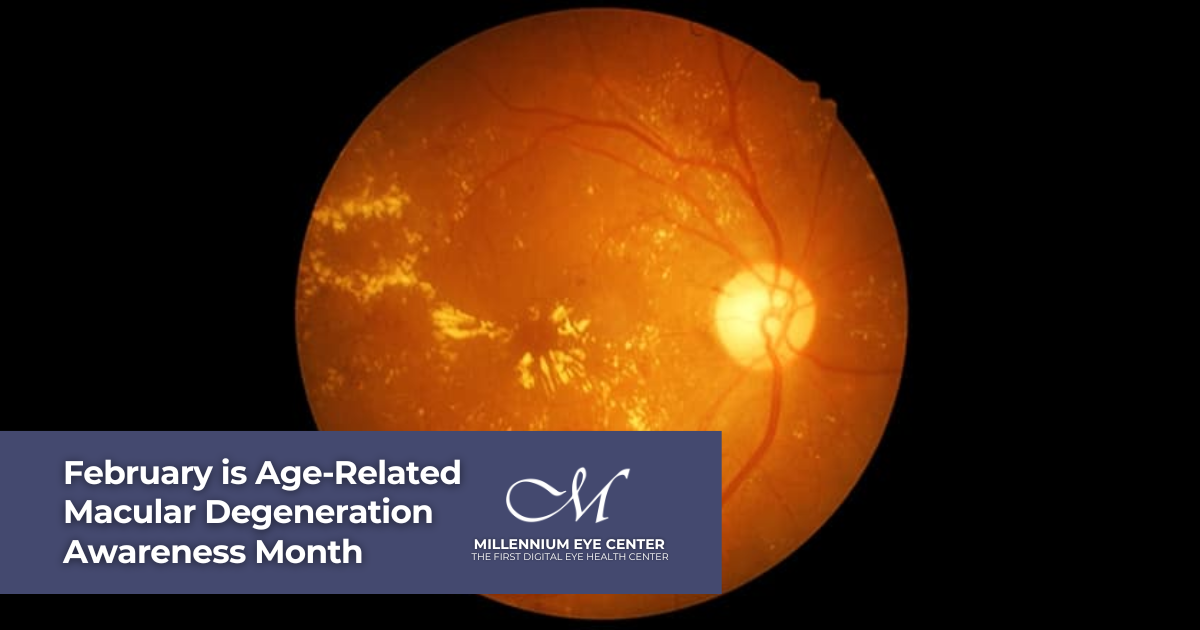Protect Your Central Vision and Prioritize Eye Health
February is Age-Related Macular Degeneration (AMD) Awareness Month, an essential time to focus on one of the leading causes of vision loss among adults over the age of 50. AMD affects the macula, the central portion of the retina responsible for sharp, detailed vision. As we age, the risk of developing AMD increases, making awareness, early detection, and proactive eye care critical for maintaining healthy vision.
Understanding Age-Related Macular Degeneration (AMD)
AMD progresses over time and can significantly impact daily life by impairing central vision, which is essential for activities like reading, driving, and recognizing faces.
Types of AMD
- Dry AMD:
- The more common form, accounting for 85-90% of cases.
- Characterized by the thinning of the macula and the formation of drusen (small yellow deposits).
- Progresses gradually but can lead to significant vision loss over time.
- Wet AMD:
- Less common but more severe.
- Caused by abnormal blood vessel growth under the retina, leading to fluid leakage and rapid vision loss.
Risk Factors for AMD
While age is the most significant risk factor, other factors can contribute to the development of AMD:
- Family History: A genetic predisposition increases risk.
- Smoking: Smokers are twice as likely to develop AMD compared to non-smokers.
- Poor Diet: A lack of nutrients like vitamins C and E, zinc, and lutein can impact macular health.
- UV Exposure: Prolonged exposure to sunlight can damage the retina.
- Cardiovascular Health: High blood pressure and obesity may increase risk.
Symptoms of AMD
AMD often progresses without noticeable symptoms in the early stages. However, as it advances, you may experience:
- Blurred or distorted central vision.
- Difficulty recognizing faces.
- Dark or empty spots in the center of your field of vision.
- Reduced ability to see fine details.
Tips for Managing and Preventing AMD
- Schedule Regular Eye Exams: Early detection is key to slowing the progression of AMD. Annual comprehensive eye exams allow for early identification of changes in macular health.
- Adopt a Healthy Diet: Incorporate leafy greens, colorful fruits, fish rich in omega-3 fatty acids, and nuts to support eye health.
- Protect Your Eyes: Wear sunglasses with UV protection to shield your eyes from harmful rays.
- Quit Smoking: Reducing or eliminating smoking significantly lowers your risk of AMD.
- Exercise Regularly: Physical activity improves circulation and overall health, which benefits your eyes.
- Consider Supplements: Your eye doctor may recommend AREDS2 vitamins for individuals at higher risk or in the early stages of AMD.
Partnering with Millennium Eye Center for AMD Care
At Millennium Eye Center, we are committed to helping our patients protect their vision and navigate the challenges of AMD. Whether it’s regular screenings, personalized care plans, or advice on lifestyle changes, we’re here to support your eye health journey.
Take Action Today!
AMD doesn’t have to dictate your future. Click HERE to schedule an eye exam with us or call/text 407-292-9812 to take the first step toward preserving your vision and ensuring lifelong eye health.
Disclaimer
This blog is for informational purposes only and is not a substitute for professional medical advice, diagnosis, or treatment. Always consult your eye doctor or healthcare provider for personalized care and recommendations regarding your eye health.

